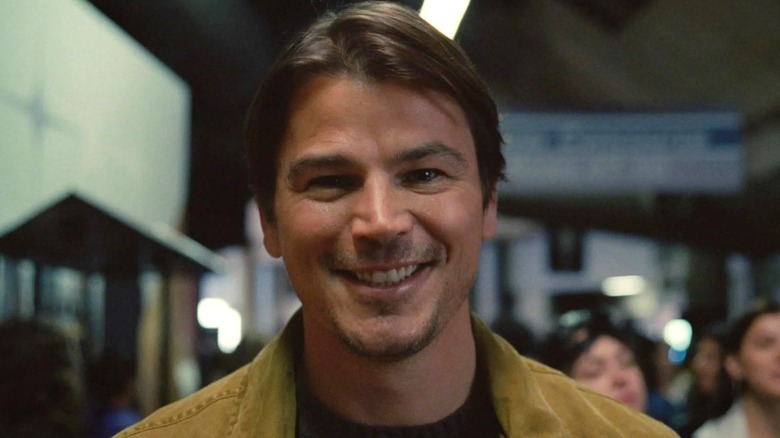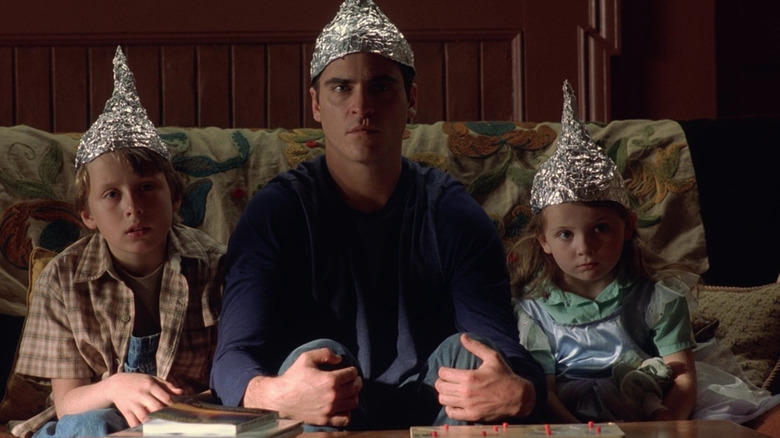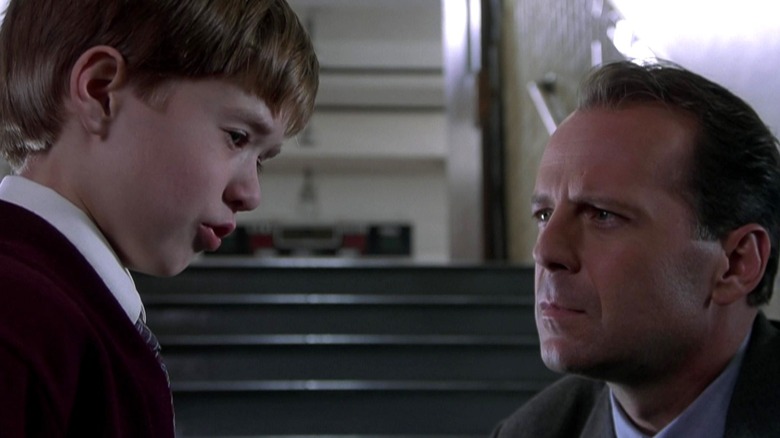The Correct Order To Watch All Of M. Night Shyamalan's Movies
We may receive a commission on purchases made from links.
M. Night Shyamalan's 30-year-plus career has gone through many highs and lows — from rising to prominence as an innovative auteur to becoming a parody of himself with a string of unsuccessful studio sludge, then experiencing a comeback through the lo-fi horror genre. Whether he's viewed as a critical darling or a critical punching bag, Shyamalan continues to deliver suspenseful stories that delve into the darkest, most emotional corners of the human psyche.
After his masterpiece "The Sixth Sense" thrust him into the spotlight, Shyamalan became synonymous with supernatural thrillers that deliver a gobsmacking twist, turning the world of the film completely upside down. But soon these astonishing final revelations became an expectation that not every film was able to deliver, even becoming ridiculously absurd.
Watching all of Shyamalan's films makes it clear how he uses the paranormal to uncover the core of our humanity. These ghostly or science fiction elements provide a foundation to explore our relationships between faith and doubt, destiny and free will, grief, and the existence of higher powers. It is these thematic tensions, coupled with his artful construction of taut suspense and emotional melodrama, that establish him as a filmmaker of deep feeling.
You shouldn't watch them in chronological order
For the sake of clarity, here's the order that the films were released.
- Praying with Anger (1992)
- Wide Awake (1998)
- The Sixth Sense (1999)
- Unbreakable (2000)
- Signs (2002)
- The Village (2004)
- Lady in the Water (2006)
- The Happening (2008)
- The Last Airbender (2010)
- After Earth (2013)
- The Visit (2015)
- Split (2016)
- Glass (2019)
- Old (2021)
- Knock at the Cabin (2023)
- Trap (2024)
But the "correct" order to watch M. Night Shyamalan's movies is not chronologically, but one that lets you observe the distinct phases of his career. Viewing his films in this jumbled way allows you to trace the consistent aspects of his storytelling and visual style across different decades.
- The Sixth Sense (1999)
- Signs (2002)
- Unbreakable (2000)
- Split (2016)
- Glass (2019)
- The Village (2004)
- The Visit (2015)
- Old (2021)
- Knock at the Cabin (2023)
- Trap (2024)
- Wide Awake (1998)
- Praying with Anger (1992)
- Lady in the Water (2006)
- The Last Airbender (2010)
- After Earth (2013)
- The Happening (2008)
While "The Sixth Sense" set such a high bar that it was difficult for Shyamalan's films to measure up, the film serves as the ideal starting point because it establishes the type of humanist horror that would come to define the rest of his work. It's best to get "The Sixth Sense" out of the way, as it were, so that you can fully appreciate the rest of his movies. Its near-flawless execution will certainly get you interested in viewing the rest of his canon, starting with "Signs" which also explores redemption and grief.
"Unbreakable" marks the beginning of a trilogy, followed by the exhilarating sequels "Split" and "Glass" decades later, which questions the real-world repercussions if superheroes actually existed. "The Village" is one of Shyamalan's best films that was (unfairly) maligned by critics upon its release, possibly due to audience fatigue from the director's signature twists. Many overlooked the film's hypnotic allure and emotional resonance in its depiction of mass hysteria and cult-like environments.
"The Visit," "Old," "Knock at the Cabin," and "Trap" are strong films that mark M. Night Shyamalan's resurgence. "Wide Awake" and "Praying with Anger" provide a glimpse into the director's early career and his initial focus on other genres such as comedy, drama, and family issues — some of which are autobiographical. The rest of the titles are Shyamalan at his worst and are only worth viewing if you would like to see the full scope of his career.
Beyond the shadow of The Sixth Sense
Several critics unjustly measured M. Night Shyamalan's subsequent films against "The Sixth Sense," often disregarding the unique narratives, creative twists, and thought-provoking themes of his other movies. While it certainly is a career-defining and nearly perfect piece of cinema, so many other films in his oeuvre are just as impressive.
Jumping between M. Night Shyamalan's movies in the abovementioned order will give you a broader perspective of his filmmaking capabilities. You can see how, across different years, he consistently crafts tangled narratives that unspool with high tension and overwhelming emotion. Even when Shyamalan's twists defy all logic, he inspires his audience to contemplate the fragility of human existence. Grief is a running theme throughout Shyamalan's movies, forcing us to ponder our waning mortality, the legacy we leave behind, our yearning for departed loved ones, and the mysteries of the afterlife. Even with all the fluctuations in his career, there is no denying M. Night Shyamalan has a singular vision that sets him apart from most filmmakers.


